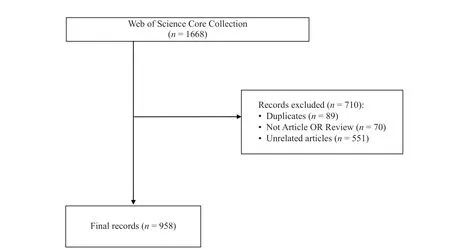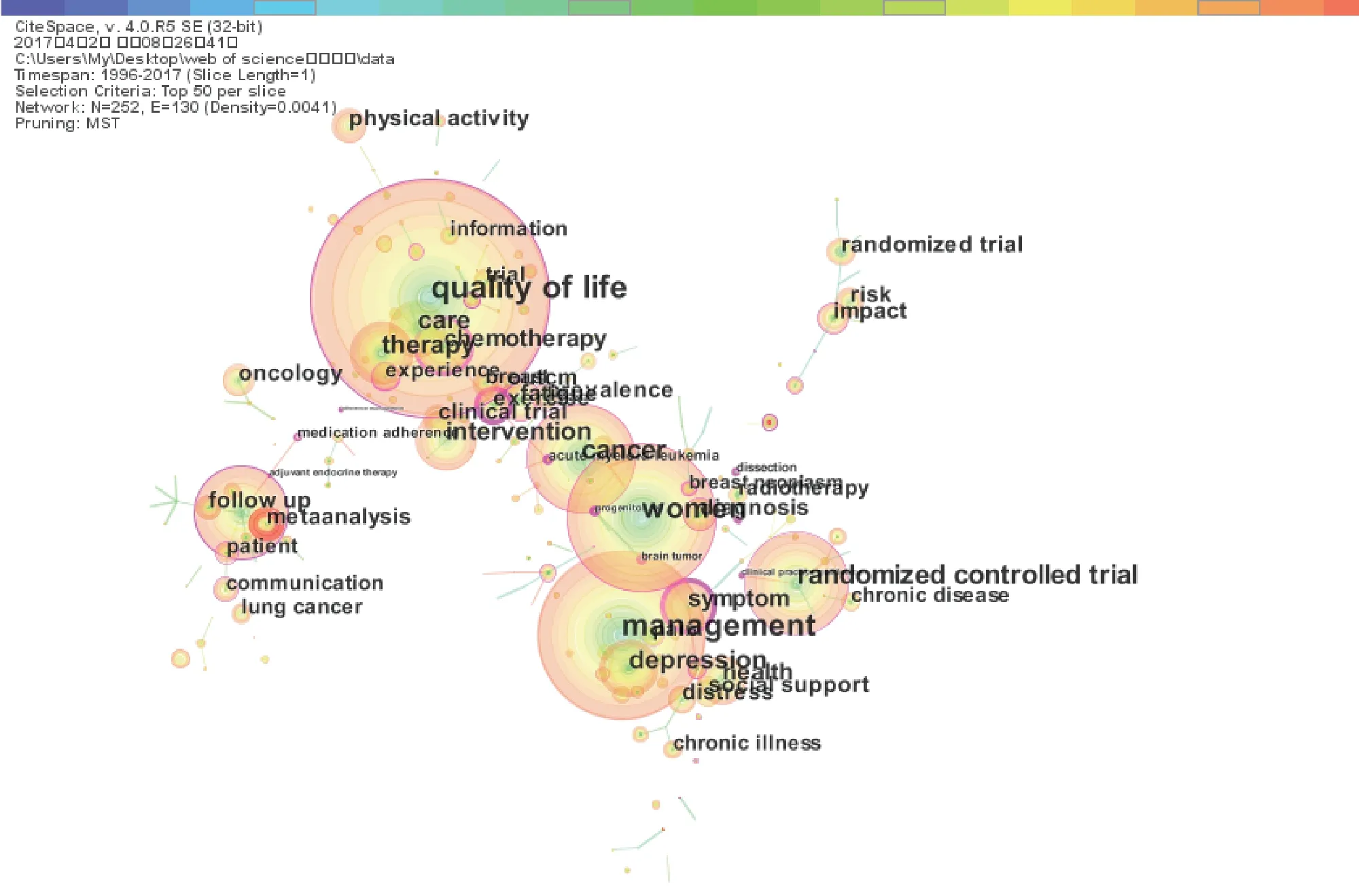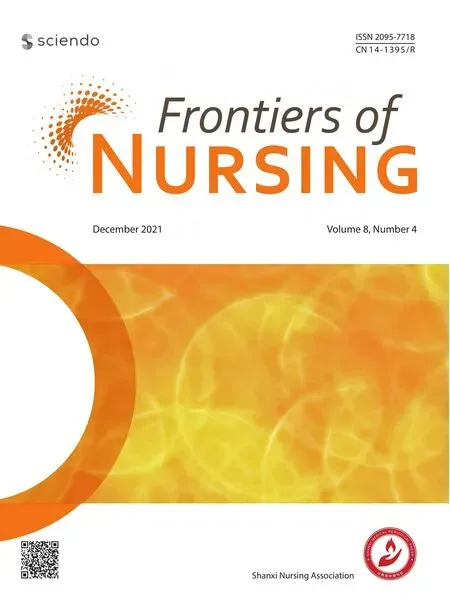Visualization analysis of research“hot spots”: self-management in breast cancer patients†
Tong-Tong Jing, Tomoko Mjim, Tie-Ying Shi*
aGraduate School of Nursing, Chiba University, Chiba 260-8672, Japan
bDepartment of Nursing, The First Affiliated Hospital of Dalian Medical University, Dalian, Liaoning 116011, China
Abstract: Objective: To identify the research on “hot spots” and frontiers of self-management in patients with breast cancer.
Keywords: breast cancer • evidence-based practice • psychological health • quality of life • self-management
1. Introduction
Breast cancer is the leading cause of cancer among women in China, and there is an upward trend in its morbidity and mortality.1Given the increased cure rate and survival time of patients with breast cancer, the World Health Organization (WHO) has classified it as a chronic disease and regards it as a chronic life condition.2How to improve the quality of life (QOL) of patients with breast cancer, particularly through self-management,has become the focus of worldwide research. Self-management refers to the ability to manage symptoms, treatment, physiology, and psychology, and to make lifestyle changes in response to chronic disease.3Numerous studies4have confirmed that there is a positive correlation between the level of self-management and QOL.Although effective self-management is essential for the long-term survival and QOL of patients with breast cancer, research on self-management by patients with breast cancer in China is in its infancy stage.5We used CiteSpaceIII in this study to analyze and integrate the worldwide literature, contained in the Web of Science database, on self-management by patients with breast cancer. The aim of the analysis was to identify frontiers and “hot spots” (i.e., particularly active topics of study)in research on self-management by patients with breast cancer to provide more information for researchers.
2. Methods
2.1. Data collection
The data were obtained from the “Web of Science Core Collection” database on March 27, 2017. The inclusion criteria: The topic search phrase was “(breast cancer)AND (self-management)” and the document types were“Article OR Review.” The exclusion criteria: Repeated publications and unrelated articles were excluded. The search identified a total of 958 documents. The flowchart shows this process in Figure 1. Information about the documents was recorded, including their titles,authors, keywords, abstract, and references. Then, we downloaded and saved each one as a plain text file, with the extension “txt.”
2.2. CiteSpace III
CiteSpace III is a software based on a Java platform and was developed by Dr. Chen of Drexel University. This tool provides visual-knowledge maps that researchers can use to discover core institutions, authors, “hot spots,”and trends in a research field.6This study used a yearly time-slice and the threshold was TOP = 50. We imported the 958 records into CiteSpace III for analysis, choosing“country (region)” and “keyword” as the network nodes.
3. Results
3.1. Region
Figure 2 illustrates that using “country (region)” as a network node produced an image with 53 nodes, 17 lines,and a 0.0123 density. That is, a total of 53 countries(regions) had made contributions to the research field of self-management by patients with breast cancer. The size of the nodes in the figure represents the number of the documents (articles or reviews) while the color of the outer rings represents the year.
Figure 2 and Table 1 show that the United States of America (USA) was the country with the largest number of articles and reviews on research about selfmanagement by patients with breast cancer, followed by UK, Australia, and Canada; China ranked eighth. This finding indicates that research on self-management in patients with breast cancer was mainly conducted in developed countries. Although China ranked in the top 10, the quantity of research in China is very less and lagged far behind that of the USA.
3.2. High-frequency keywords
This paper chose high-frequency keywords (top 20) to identify the research “hot spots” of studies on self-management by patients with breast cancer.7

Figure 1. The flow diagram of illustrating literature search and selection.

Figure 2. Network of co-countries (regions) publishing research papers on self-management by patients with breast cancer (one-year slices).

Table 1. The top 10 countries (regions) publishing research on self-management by patients with breast cancer.
Figure 3 illustrates the results using “keyword” as the network node. The figure revealed there were 252 nodes, 130 lines, and a 0.0041 density. To make the mapping clearer, we excluded some keywords, such as“breast cancer” and “self-management.”
Table 2 clearly shows that except for “breast cancer,”the frequency (F) of “QOL” (F= 301) was the highest.This was followed in descending order by “management” (F= 219), “women” (F= 191), “cancer” (F= 141),and “randomized controlled trial” (F= 135).
3.3. Burst terms
Burst terms (i.e., a term that suddenly appears significantly more frequently or in a shorter amount of time)can reflect research frontiers. Table 3 shows that the burst terms for research on self-management among patients with breast cancer were “carcinoma,” “health status,” and “meta-analysis”; the bursting years were 1996, 2004, and 2015.
4. Discussion
4.1. China should strengthen research on self-management by patients with breast cancer

Figure 3. Network of co-words used in research papers on self-management by patients with breast cancer (one-year slices).

Table 2. The top 20 keywords in research on self-management by patients with breast cancer.

Table 3. Burst terms in research on self-management by patients with breast cancer.
We know from the present results that research on selfmanagement by patients with breast cancer has been conducted mainly in developed countries, such as the USA, England, and Australia. This may be because the self-management of chronic diseases has been incorporated into national primary healthcare in these countries and has been highlighted by the states. The largest number of papers on this topic was from the USA, making the USA the main source of research on self-management in patients with breast cancer. Since the early 1970s, researchers in the USA have conducted a large number of studies in this field and have developed some mature theories, one of which underlies the selfmanagement program for patients with breast cancer,which was developed by Professor Cimprich’s team at the Nursing School of the University of Michigan.8In contrast, research on self-management in patients with breast cancer is in its infancy stage in China. China ranks eighth in this research field and its research is far behind that in the USA in terms of the number of published studies. However, as English is not the mother language of China, it is difficult for researchers in China to publish their studies in English-language journals, which limits their ability to present their existing research results on international communication platforms. On the other hand, as the development of self-management strategies for patients with breast cancer is based on a mature and comprehensive community-care service system, their development is restricted by the fact that community nursing in China is still in its preliminary stage. Hence, perfecting the structure of community-health services in China is a prerequisite for promoting research on self-management among patients with breast cancer.
4.2. Analysis of research “hot spots”
4.2.1. Self-management is an important way to improve the QOL of patients with breast cancer
As QOL is a central element in individuals’ evaluations of their own health status, it has become the primary outcome measure of the effectiveness of cancer treatment. Given the increased treatment for breast cancer and the prolongation of life, ensuring patients to have an optimum QOL has become the most important aim of breast cancer treatment. Effective self-management behaviors improve patients’ QOL and have long-term benefits for those with breast cancer. Our visual analysis of studies on self-management in patients with breast cancer showed that QOL has become one of the “hot spots” of research in the field. A 2016 systematic review of the effects of physical self-management on QOL in breast cancer patients by some researchers,4who analyzed 13 Randomized Controlled Trials(RCTs), representing 2180 participants, concluded that physical self-management interventions have beneficial effects on QOL in this population. A 2013 non-randomized clinical trial divided 147 multi-ethnic survivors (stages I–III of breast cancer) into a usual care group (n= 78) and a 4-week, self-management intervention group (n= 68), which included managing medical, emotional, health, and role tasks. At followup, the QOL of the experimental group was greater than the control group, which demonstrates that selfmanagement programs can help to increase patients’QOL.9The results of the research in this field in China are basically identical to those from other counties,with Chinese studies finding that self-management is an important way to improve the QOL of breast-cancer survivors. Li Guoyuan10found that medical staff had a positive effect on the QOL of breast cancer survivors by using a self-management intervention addressing symptoms, behaviors, emotions, and knowledge management.
Our review showed that national studies have demonstrated self-management can improve the QOL of breast cancer survivors. Although the intervention used in different studies included different content, they all involved management of disease,emotions, health-related knowledge, and behavioral roles. Clinical nurses can take advantage of selfmanagement as an intervention to improve patients’participation in controlling their own disease and to enhance the ability of patients to take an active part in healthcare activities. This model can both save medical resources and improve the QOL of breast-cancer survivors.
4.2.2. Self-management is an effective way to improve the psychological health of patients with breast cancer
Our findings indicate that psychological status is another “hot spot” in research on self-management in patients with breast cancer. Due to the nature of the disease, breast-cancer survivors often suffer from anxiety,depression, and cancer-related fatigue before and after treatment. Research on self-management by patients with breast cancer has confirmed that the psychological well-being of breast-cancer survivors and self-management behaviors influence each other, such that patients who have good self-management behaviors also have good psychological health, including lower levels of negative emotions such as anxiety, depression, and cancerrelated fatigue.11
It has been suggested that researchers investigate practical self-management methods that include interventions based on cognitive behavioral therapy for patients. This could improve self-management behaviors and psychological health at the same time. Ultimately this research can achieve the goal of improving the QOL of breast-cancer survivors.
4.2.3. Advances in research on self-management in patients with breast cancer and promoting the development of specialization in nursing science
This study illustrated, based on “meta-analysis” combined with “randomized controlled trial,” that the evidence-based practice is a research trend and frontier in studies on the treatment of patients with breast cancer.The field of nursing has reached a consensus about evidence-based nursing that is consistent with the global field of evidence-based healthcare. The International Council of Nurses disseminated a white paper,called “Closing the gap: from evidence to action,” on the 100th International Nurses Day, which encouraged nursing staff all over the world to develop nursing research activity to support evidence-based practice and to abandon decision-making based on personal experience or professional traditions.12Opportunities have been identified to improve care through better implementation of existing evidence and advocacy for research that promotes the development of specialization within nursing science.13Thus, we should develop research to investigate self-management by patients with breast cancer. To acquire the best evidence for improving self-management behaviors and the QOL of breast-cancer survivors, we need to conduct welldesigned studies, introduce the evidence into practice,and encourage the clinical implementation and evaluation of the best evidence. We believe this will promote research on self-management by patients with breast cancer in the direction of standardization, scientization,and specialization.
Ethical approval
Ethical issues are not involved in this paper.
Conflicts of interest
All contributing authors declare no conflicts of interest.
- Frontiers of Nursing的其它文章
- Predictors of nurse’s happiness:a systematic review
- Redefining the concept of professionalism in nursing: an integrative review
- Clinical nursing competency assessment:a scoping review
- Moderating effect of psychological resilience on the perceived social support and loneliness in the left-behind elderly in rural areas†
- Effects of progressive muscular relaxation and stretching exercises combination on blood pressure among farmers in rural areas of Indonesia: a randomized study†
- Emotional intelligence and its impacts on the clinical performance of nurses in general public hospitals

